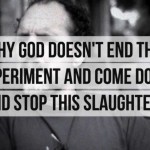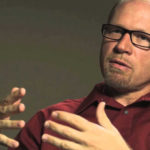We run our website the way we wished the whole internet worked: we provide high quality original content with no ads. We are funded solely by your direct support. Please consider supporting this project.

Is God All-Powerful?
I want to answer yes and no. God is all-powerful in the sense that God originally possessed all power. Before Creation, God was the only being who existed, and thus had all the power there was. He could do anything, and nothing opposed Him.
But with the creation of free creatures, I maintain, God necessarily surrendered a degree of His power. Or perhaps it is better to say God delegated some of His power. Our freedom is a little piece of “controlling power” lent us by God. In order to allow creatures to be free, then, God voluntarily gives us a portion of His power, and thereby surrenders His opportunity to “always get His way.” I don’t think it could be any other way, for freedom must entail that the free person can decide his own way—and it may not agree with God’s way. It is utterly impossible for God to be always in control and yet allow free beings to exercise some control. Thus, to the extent that God “lends” power away, He no longer utilizes it.”
However, what’s important to realize, is that this “surrender” of control is completely a voluntary act of God. If there is “limit” on God’s power, it is only there by His decision, not some power outside of Himself. If God at some point can’t do something (e.g., rid the world of a particular evil), it’s only because He decided to create a world in which there would be times when He could do nothing. Only if some power outside God limited God could He properly be said not to be omnipotent (all-powerful). Thus, in my view, God is in essence all-powerful, though He now chooses not to be. And the reason is because He desires a creation which is capable of love, and thus “must be free (have some “power” of its own).
A related question is: Is God in control? Again, yes and no. Since it is God Himself who delegates how much power each creature has, God is, in this sense, “in control.” He determines the parameters of our freedom within the flow of history which He directs, and in this sense God is always “in control.” For this reason there is absolutely no chance that God could ever lose this “cosmic battle.” As much power as Satan has, the ultimate purpose of God—to have a creation which shares love with Him—is never threatened.
However, God does not control each particular individual, for each person must be to some extent free. Hence, within the limits set by God, an individual may purpose to do things which are utterly at odds with God’s ultimate purpose. Thus, when an individual inflicts pain on another individual, I do not think we can go looking for “the purpose of God” in the event. Of course, God allowed the event to occur because His ultimate purpose includes having free agents, and this freedom must be irrevocable. But to “allow” something and to “purpose it” or “cause it” are two very different things.
While God has given humanity and other spiritual beings a great deal of freedom, He has not come close to surrendering all control to them. He is, even in this present still the most powerful being, even if He does not, by His own decision, exercise all power. God still exercises the dominating influence in the world, and He only knows what this world would be like without His constant, holy influence.
—adapted from Letters from a Skeptic, pages 57-60
Image by Josh Felise
Category: Q&A
Tags: Free Will, Letters from a Skeptic, Love, Omnipotence, Open Theism
Topics: Providence, Predestination and Free Will
Related Reading

What is the significance of Exodus 13:17?
The Lord didn’t lead Israel along the shortest route to Canaan because Israel would have had to fight the Philistines. The Lord wanted to avoid this, “Lest the people change their minds when they see war, and they return to Egypt.” [NIV: “If they face war they might change their minds and return to Egypt”].…

Divine Wisdom
Why doesn’t God end it all and stop the slaughter? Why does God allow suffering and evil to go on so long? Here, Greg offers two possible answers to these questions. Option A is that all evil somehow is designed by God and somehow brings glory to him. But Greg thinks Option B is a better explanation, and it involves…

To What Extent is the Future Open to Real Possibilities?
We frequently get questions about the extent to which the future is composed of actual possibilities rather than settled or determined. Here’s what Greg has to say in response to these questions: 1. We can be confident the future is settled, to the extent that the Bible depicts the future as settled. This, of course,…

Why Can’t God Stop Evil? The Thomas J. Oord Interview (podcast)
Greg and Thomas talk about Open Theism and how Greg’s views differ from Thomas’s. Theology nerds, get your compass and your flashlight and prepare to go DEEEEEP in the weeds! Thomas’s book: God Can’t Episode 487 http://traffic.libsyn.com/askgregboyd/Episode_0487.mp3

What is the significance of Judges 2:20–3:5?
The Lord did not provide any assistance in Israel’s battles, “In order to test Israel, whether or not they would take care to walk in the way of the Lord as their ancestors did” (vs. 22). The pagan opponents of Israel “were for the testing of Israel, to know whether Israel would obey the commandments…

Trinity and Love
Steve via Compfight There is a lot of mystery around the concept of the Trinity, and because the word is not used in Scripture some people think it’s not “Biblical”. David D. Flowers posted a very clear and concise article on the history and reality of the Trinity. This is a really helpful and quick…
